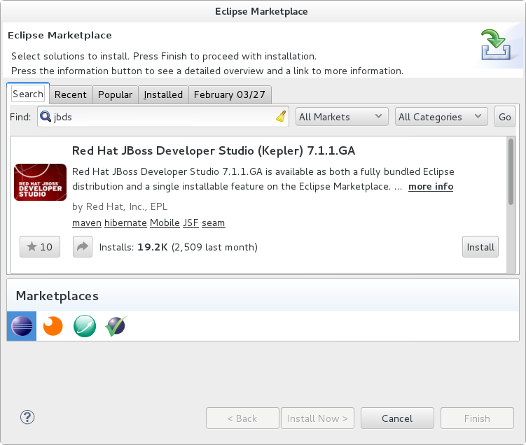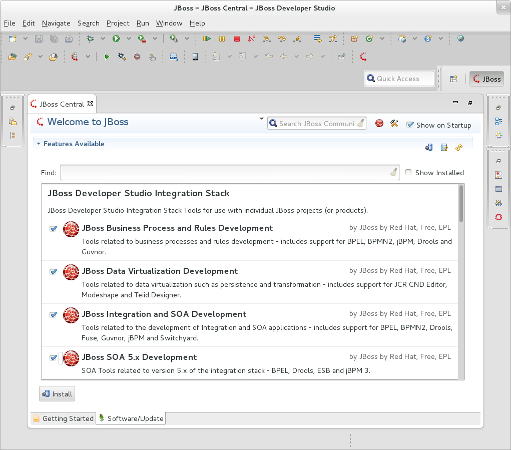We are ready with JBoss Tools 4.2 Beta1 and Red Hat JBoss Developer Studio 8 Beta1.
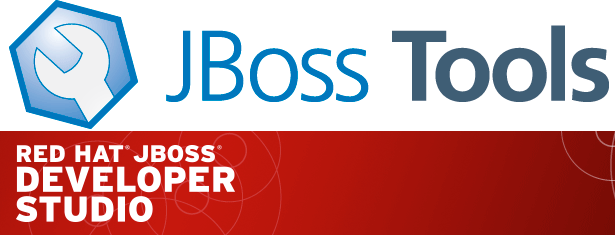
This announcement is a bit special since it is on our new website, with a cleaner and more consistent structure.
There is the specific version download available from JBoss Tools 4.2.0.Beta1.
Then there is the Luna download page which shows the latest Stable, Development and nightly download for Eclipse Luna - that is available from Luna releases.
From either of these you can get to the Downloads, updatesites and What’s New!
Installation
JBoss Developer Studio comes with everything pre-bundled in its installer. Simply download it from our JBoss Products pagerun it like this:
java -jar jbdevstudio-<installername>.jar
JBoss Tools or Bring-Your-Own-Eclipse (BYOE) JBoss Developer Studio requires a bit more:
This release requires at least Eclipse 4.4 (Luna) M6 but we recommend using the Eclipse 4.4 JEE Bundle since then you get most of the dependencies preinstalled.
Once you have installed Eclipse, you either find us on Eclipse Marketplace under "JBoss Tools (Luna)" or "JBoss Developer Studio (Luna)".
For JBoss Tools you can also use our update site directly if you are up for it.
http://download.jboss.org/jbosstools/updates/development/luna/
Note: Integration Stack tooling will become available from JBoss Central at an later date.
What is new ?
As always there is more than can be covered in a single blog but here are some of my favorites. You can see everything in the What’s New section for this release.
Refactored and improved Server Tools
The server adapters for JBoss AS, EAP and WildFly have been refactored to support…
-
…runtime-less servers (i.e. no need to have a server locally installed)
-
…deployment over management API (i.e. no need to have local or SSH based access anymore, just Management Api)
-
…start/stop scripts for deploy only servers
-
…Profiles for easier setup
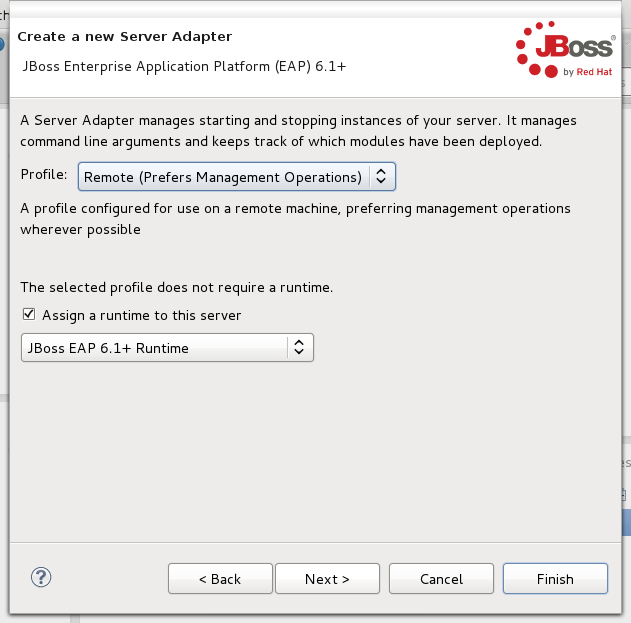
These improvements required significant changes in the server adapter core API and UI. The meat of the code is still the same - just split out to be more reusable and composable.
We would really like to hear from you if the UI is good, bad, better, worse; and in any case how we can make it even better. We’re obviously interesting in knowing whether these features do work for you.
You can see more in the Servers What’s New.
OpenShift Downloadable Cartridges
OpenShift has been offering support for custom defined cartridges - now OpenShift tools supports this natively too.
This means you can create or use an existing cartridge by choosing the "Code Anything" option for either Applications or Cartridges.
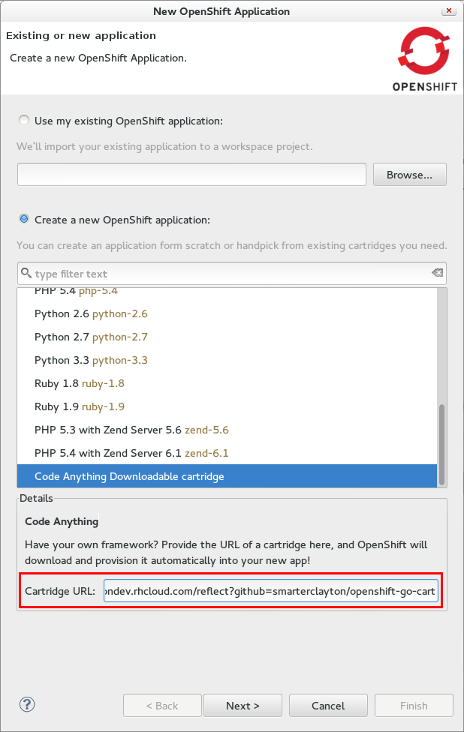
This allows you to, for example use a Cartridge like WildFly 8 or the recent OpenShift on JRebel experiment without leaving the IDE.
More support for multiple Cordova versions
The Cordova runtime support is now extended to also support using locally downloaded runtimes. Making it possible to use custom builds or simply distributions that are not directly available from Cordova repositories.
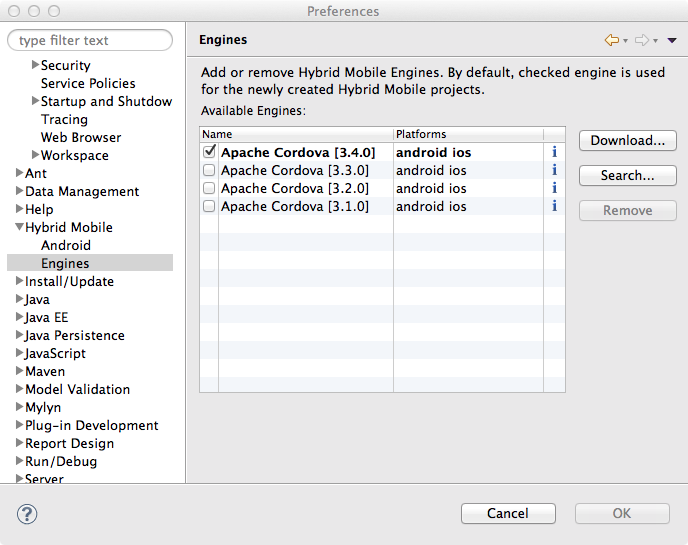
There are also various other fixes which can be viewed at Aerogear What’s New.
p.s. we are contributing these tools to eclipse.org under Project Thym.
The Cordova Simulator also now understands the notion of multiple Cordova runtimes allowing you to test against multiple versions.
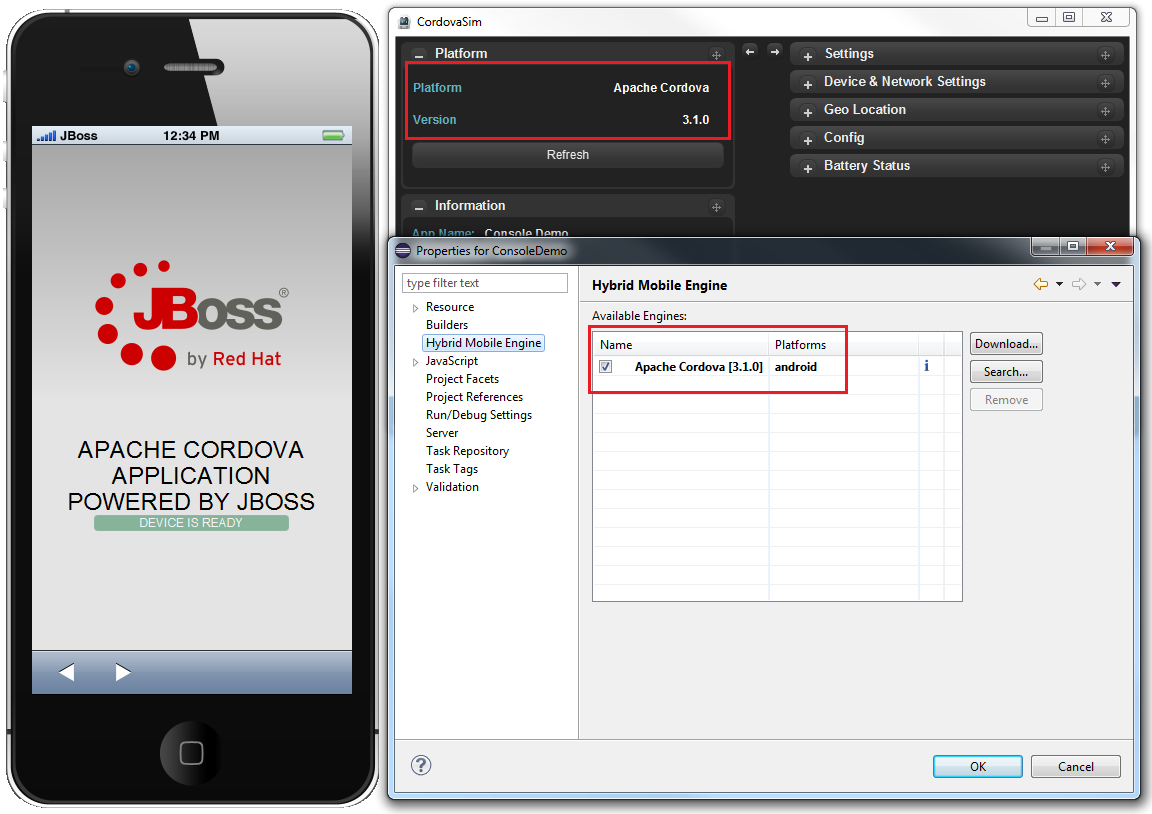
Arquillian XML Editor
The Arquillian tooling (for now only available in JBoss Tools) added a Sapphire based editor for the arquillian.xml file format.
For now it is a simple structured editor but we plan on using it for experimenting with Sapphire to provide better XML oriented editors.
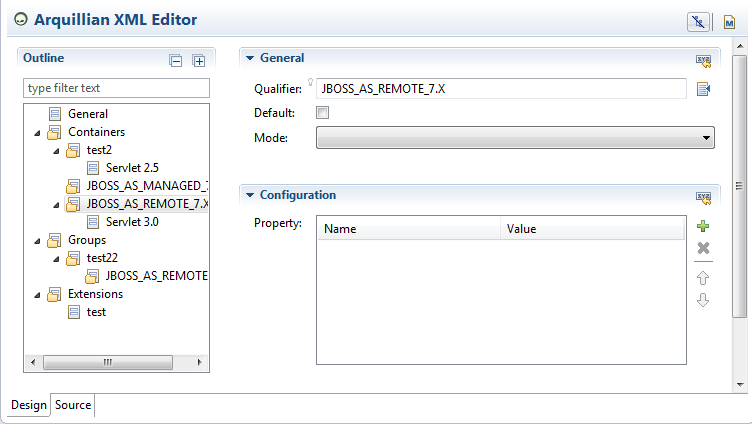
This Arquillian editor was based on ideas and initial contribution from Masao Kunii working for Nippon Telegraph and Telephone Corporation (NTT) - thank you!
Forge 2 Goodies
Recent version of Forge 1 and 2 are now distributed with tools and especially the later one brings an interesting feature.
Forge 2 Connection Profiles now will consider Eclipse Database Tooling Platform (DTP) connections meaning you no longer have to configure your database settings in multiple places.

This feature is called connection profiles in Forge 2.
Usage tracking
We have learned a lot from our last 3+ years usage tracking and continue to be amazed with how many nationalities, countries and operating system distributions the tools are used in - it has been and continue to be very informative and helpful in guiding our tooling support.
In Beta1 we have gone a step further into learning not only about how many starts JBoss Tools, but also now which features are being used.
In Beta1 we now collect info about which server types are used and which JBoss Central installs are being done to be able to see how much and how often these features are used.
We will use that in the future to decide new development and maintanence work - thus if you love a feature in JBoss Tools then please say yes to usage tracking and use the feature and we’ll notice.
Note: We are only collecting aggregated summaries of i.e. server types and installs - meaning we cannot use any of this info to identify you. It is truly anonymous usage statistics - we are not the NSA!
Next steps
While we wait for feedback on Beta1, we are already working on what will become Beta2. Some of things that are moving here are:
-
Looking at doing radical changes to how the visual page editor works since XULRunner is not maintained anymore and we need HTML5 support
-
Getting better (read: much better) javascript content assist with help from tern.java
-
Improve JavaEE 6 and JavaEE 7 support
-
Full Java8 support
-
…and more!
Hope you enjoy it and remember…
Have fun!
Max Rydahl Andersen
@maxandersen
